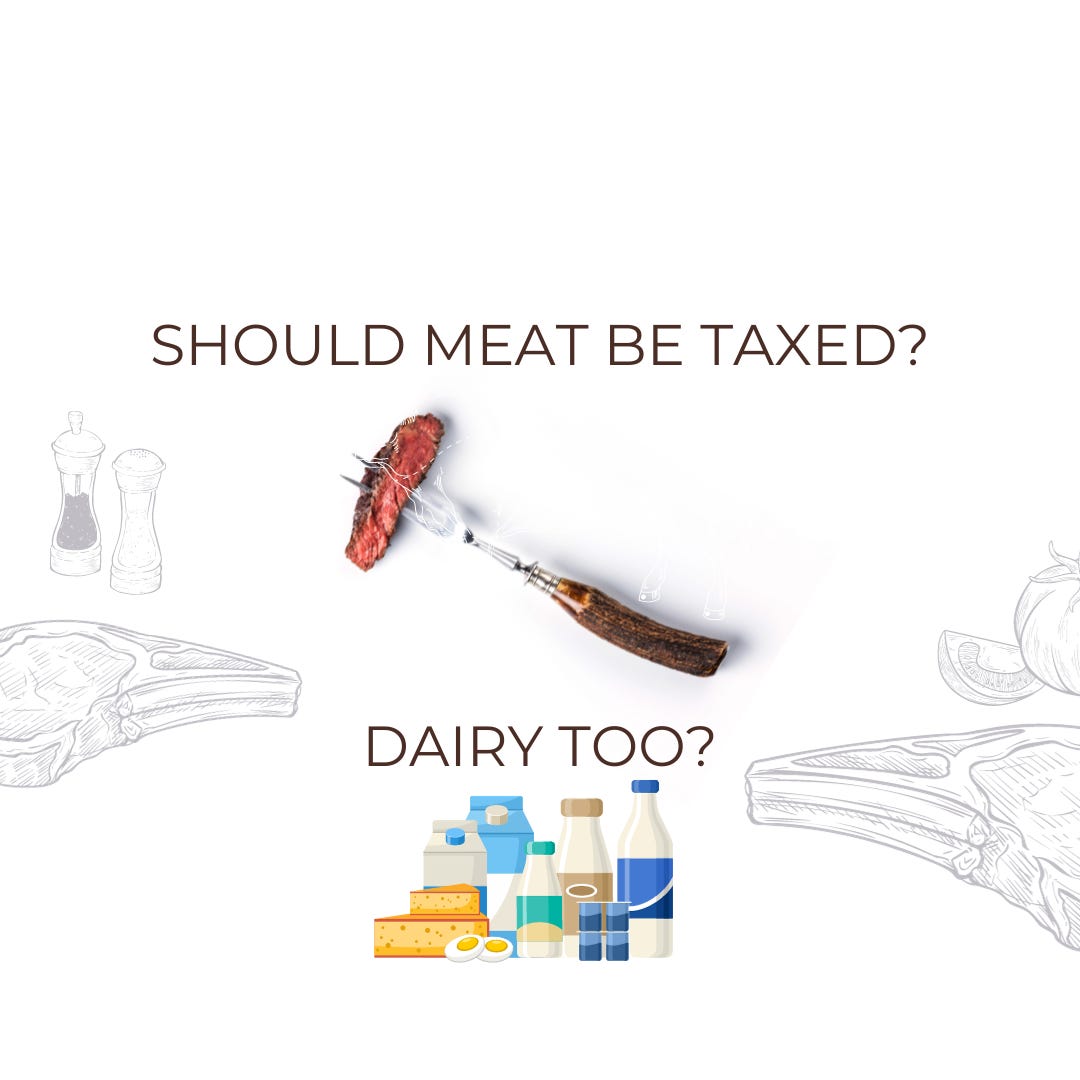A Tax on Meat: A Catalyst for Sustainability and Public Health
Choosing a healthier future for animals, ourselves and the planet
In the face of mounting environmental challenges and public health crises, implementing a tax on meat (and dairy products) is a proactive step toward creating a more sustainable and healthier future. Such a tax can promote responsible consumption, encourage dietary diversification, and reduce the burden on our planet's resources. By generating revenue, supporting sustainable agriculture, and fostering consumer awareness, we can pave the way for a more equitable, environmentally conscious, and health-driven society. It's time we take this bold step towards a better future for ourselves and generations to come.
‘‘As we navigate the challenges of the present, a tax on meat emerges as a beacon of hope, gently guiding us towards a future where our choices align with the well-being of our planet and ourselves.’’
The Urgent Need for Change
The global demand for meat has skyrocketed in recent decades, raising concerns about the environmental and health consequences associated with its production and consumption. Livestock production, particularly intensive animal farming, contributes significantly to greenhouse gas emissions, deforestation, and water pollution. These environmental impacts are further exacerbated by the vast quantities of antibiotics and other chemicals used in animal agriculture, which can contaminate water supplies and harm ecosystems.
The Environmental Impact of Meat Production
The environmental impact of meat production is undeniable. According to the Food and Agriculture Organization (FAO) of the United Nations, livestock production accounts for 14.5% of global greenhouse gas emissions, more than all transportation combined. It also drives deforestation, with about 75% of global deforestation attributed to meat production. Additionally, animal agriculture is a major source of water pollution, with animal waste contaminating waterways and contributing to the eutrophication of lakes and rivers.
The Health Risks of Excessive Meat Consumption
The excessive consumption of meat, especially red and processed meats, has been linked to various health issues, including heart disease, obesity, and certain types of cancer. The World Health Organization (WHO) has classified processed meat as a carcinogen, and red meat as "probably carcinogenic to humans."
A Tax on Meat: A Multi-faceted Solution
A tax on meat can be a powerful tool to address the environmental and health concerns associated with meat production and consumption. Such a tax would have multiple benefits, including:
Reducing greenhouse gas emissions
Protecting forests and biodiversity
Improving water quality
Promoting healthier food choices
Generating revenue for sustainable initiatives
Generating Revenue for Sustainable Change
A tax on meat could generate significant revenue that can be directed towards funding public health initiatives, promoting sustainable agriculture, and supporting research and development of alternative protein sources. This revenue could also help offset the costs associated with the environmental damage caused by intensive livestock farming.
Supporting Sustainable Agriculture
By making meat less affordable, a tax could incentivize the industry to adopt more sustainable farming practices, such as regenerative agriculture and reduced use of antibiotics. This would lead to a decrease in the environmental impact of meat production and promote a more sustainable food system.
Promoting Consumer Awareness
A meat tax could raise awareness about the environmental and health consequences of excessive meat consumption. This could encourage individuals to make more informed choices about their diets and explore healthier alternatives, such as plant-based proteins.
Addressing Equity Concerns
It is important to consider potential equity concerns that may arise with the implementation of a meat tax. Measures should be taken to ensure that vulnerable populations have access to affordable and nutritious alternatives. Government programs and subsidies can be directed towards making plant-based proteins and fresh produce more affordable, ensuring that all individuals have access to healthy and sustainable food options.
Conclusion
A tax on meat is a bold yet necessary step toward creating a more sustainable and healthier future. By addressing the environmental and health impacts of meat production and consumption, we can pave the way for a society that prioritizes the well-being of the planet and its inhabitants. It's time we take this responsibility seriously and embark on a journey towards a more sustainable and equitable food system.
Resources
Livestock's Long Shadow: Environmental Issues and Options by the Food and Agriculture Organization (FAO) of the United Nations
Taxing Meat: Taking Responsibility for the True Costs of Animal Agriculture by Farm Animal Investment Risk and Return (FAIRR) Initiative
Environmental Impacts of Food Production and Consumption: A Report to the Department for Environment, Food, and Rural Affairs by the Sustainable Development Research Network
Meat Taxes: Assessing the Potential Impact on Human Health and the Environment by The Lancet Planetary Health




